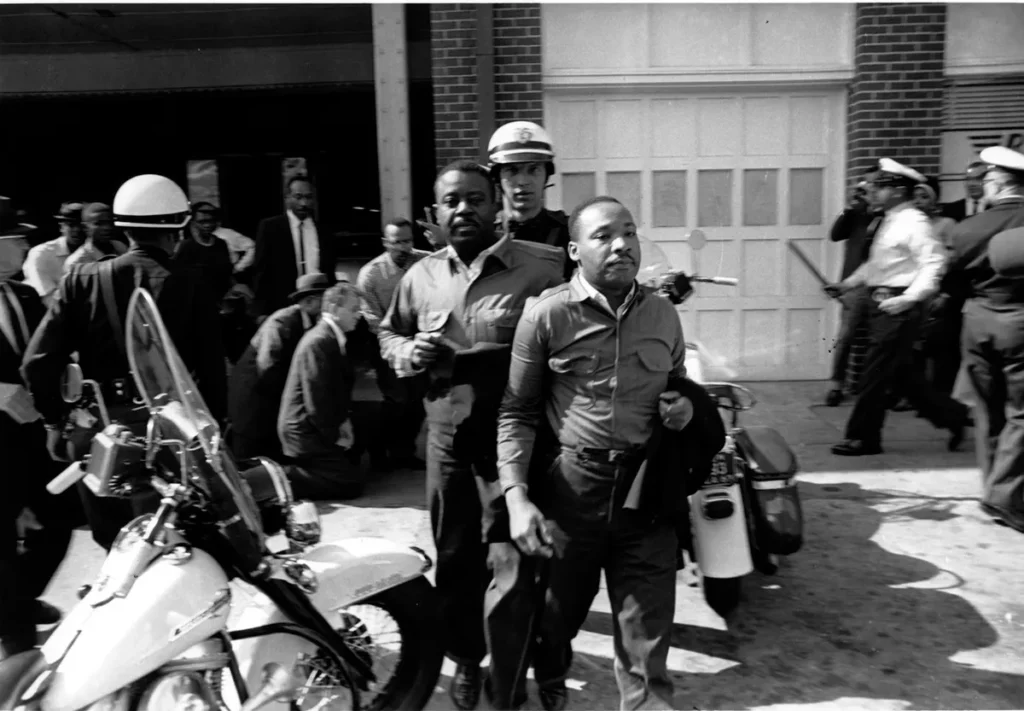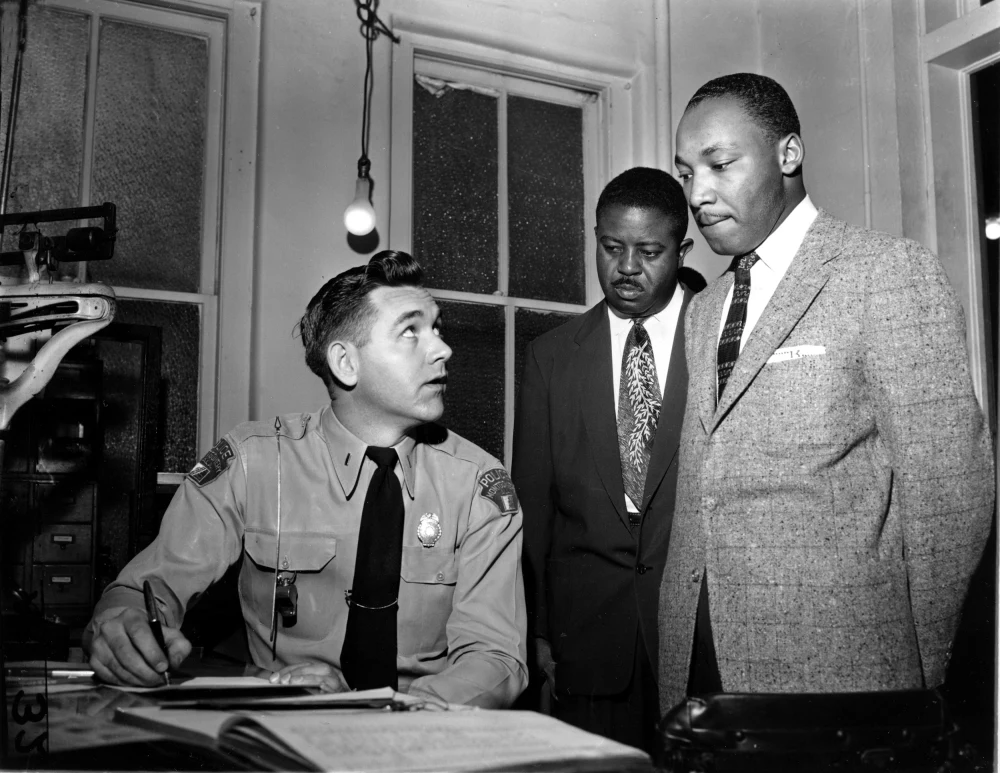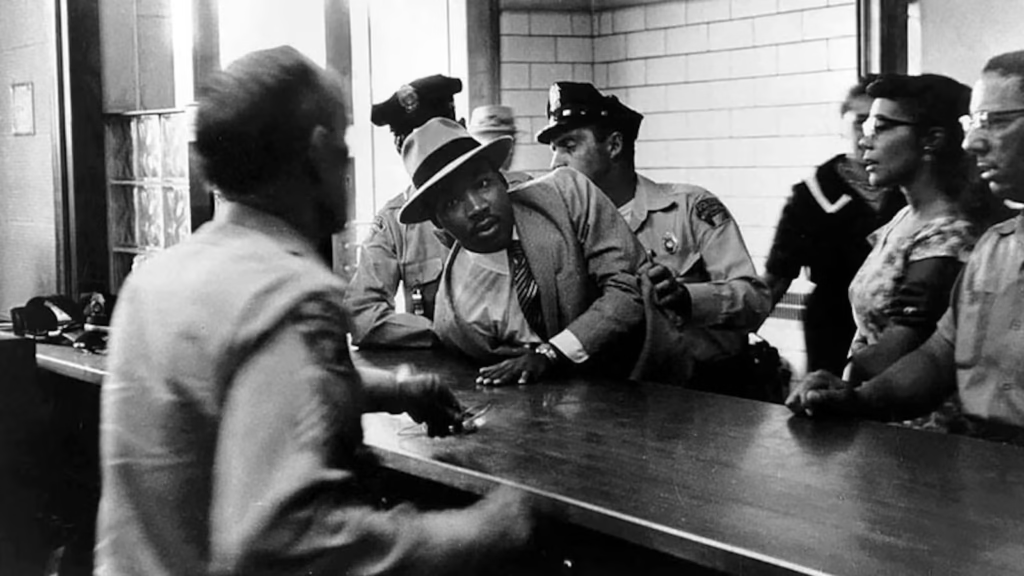This article originally appeared on this site on January 16, 2016. It will be shared every Martin Luther King, Jr. Day holiday.
My later life has taught me, if more than any period before it, that many of my fellow white folks have this very romanticized perception of the work of Dr. Martin Luther King, Jr. Or I should say that they skew his work to the point of ignorance to fit their discomfort with nearly any state of black protest that makes them uncomfortable. (Let’s not even talk about their skewed view of James Baldwin, Billie Holiday, or a plethora of other Black artists, thinkers, and leaders.)
When #BlackLivesMatter took to the streets in 2013, in protest of the acquittal of George Zimmerman for the murder of 17-year-old Trayvon Martin, white people screamed repeatedly that Dr. King would have never endorsed such rambunctious activity—despite the fact that on March 21, 1965, referred to as Bloody Sunday, Dr. King led thousands of marchers cross the Alabama River on the Edmund Pettus Bridge in Selma, shutting down any form of traffic and certainly lacking a sense of Oh-I’m-Sorry-We-Don’t-Mean-to-Be-in-the-Way.
Then a Black man decided to not take to the streets; to not scream; to simply sit and be silent. And you, my fellow white people, still got angry.

Us white people love to misalign history when it befits us—be it for Colin Kaepernick or Rosa Parks.
When that moment came, when Colin Kaepernick opted to be silent and take a knee on Sept. 1, 2016, white people then screamed repeatedly at his so-called disrespect, that nothing can be achieved being a “seat warmer,” that battles were not fought sitting down… When I countered that Rosa Parks achieved more sitting down than she ever did standing up, I had this thrown at me by a fellow white dude:
“Rosa Parks was tired, she sat. The man who came afterward, Dr. Martin Luther King, stood. He spoke. He was not violent but he also wasn’t silent… He would look much more credible if he were to do something other than sit down during the National Anthem or spout off about social injustice while wearing a Castro shirt [sic; it was a shirt that showed pictures of Malcolm X meeting Castro]. He looks like a spoiled, uninformed pro athlete that is trying to stay relevant after losing his starting QB spot. His cause is just, his credibility and attitude are lacking.”
Despite the historical stupidity that Rosa Parks was “tired” so that’s why she sat, the inference that King “stood,” that King was valiant in both his mission and his methods while somehow, Kaepernick is not is nothing short of insipid, lazy readings of King.

Our dumb obsession with quoting Martin Luther King, Jr. to justify our own systemic racism is, well, dumb.
White folks love to quote King’s “I Have a Dream” speech, particularly in parcels: “not be judged by the color of their skin, but by the content of their character.” Of course, they ignore the fact that a few sentences later in that very speech, police brutality—the suffering it causes, the frustration it sparks—becomes a focus…
White folks love to talk of King’s “peaceful” approach to everything but often ignore his hard truths that ranged from harsh criticisms of the military-industry complex to support for living wages…

And when it came to riots, here are the Reverend’s direct words from a 1968 speech entitled “The Other America”:
But it is not enough for me to stand before you tonight and condemn riots. It would be morally irresponsible for me to do that without, at the same time, condemning the contingent, intolerable conditions that exist in our society. These conditions are the things that cause individuals to feel that they have no other alternative than to engage in violent rebellions to get attention. And I must say tonight that a riot is the language of the unheard. And what is it America has failed to hear?…It has failed to hear that the promises of freedom and justice have not been met. And it has failed to hear that large segments of white society are more concerned about tranquility and the status quo than about justice and humanity.

The white-centric absurdity of vacuously adoring nobility in both mission and the method of that mission is exhausting and inanely hypocritical.
So you say these things, white folk. You say that King was noble in both mission and method—despite the fact that Dr. King directly addressed what he called “moderates” who do precisely what you are doing: agreeing with the cause but not the methods of black protest.
In fact, he found them to be possibly more dangerous than white supremacists themselves:
I must confess that over the past few years I have been gravely disappointed with the white moderate. I have almost reached the regrettable conclusion that the Negro’s great stumbling block in his stride toward freedom is not [white supremacist], but the white moderate, who is more devoted to “order” than to justice; who prefers a negative peace which is the absence of tension to a positive peace which is the presence of justice; who constantly says: “I agree with you in the goal you seek, but I cannot agree with your methods of direct action”; who paternalistically believes he can set the timetable for another man’s freedom; who lives by a mythical concept of time and who constantly advises the Negro to wait for a “more convenient season.” Shallow understanding from people of good will is more frustrating than absolute misunderstanding from people of ill will. Lukewarm acceptance is much more bewildering than outright rejection.

I had hoped that the white moderate would understand that law and order exist for the purpose of establishing justice and that when they fail in this purpose they become the dangerously structured dams that block the flow of social progress. I had hoped that the white moderate would understand that the present tension in the South is a necessary phase of the transition from an obnoxious negative peace, in which the Negro passively accepted his unjust plight, to a substantive and positive peace, in which all men will respect the dignity and worth of human personality. Actually, we who engage in nonviolent direct action are not the creators of tension. We merely bring to the surface the hidden tension that is already alive. We bring it out in the open, where it can be seen and dealt with. Like a boil that can never be cured so long as it is covered up but must be opened with all its ugliness to the natural medicines of air and light, injustice must be exposed, with all the tension its exposure creates, to the light of human conscience and the air of national opinion before it can be cured.

Replacing misinterpreted King quotes with your lack of a backbone doesn’t substantiate your innate desire for superiority.
My fellow white people’s distortion of Dr. King’s battles, of his thoughts, of his actions, of his writings…
It’s very hard to argue that King would see the whole “rich brat” argument or the “he should be thankful for his career” argument or “he was raised by white parents” argument as anything less than a distraction from the ultimate problem: the racism and police brutality that Kaepernick seeks to highlight.
It’s very hard to argue that King would not be horrified by the happenings in Ferguson or by the protests that followed—including ones that blocked traffic.
So, to the many white folks out there sensing trepidation about supporting or even caring to know about black protest…
To the many white folks with too fragile of an ego to admit that perhaps they have more handed to them not because of their character or their work or their dedication or their spirit but simply for existing…
As you spout off repeatedly, shouting King-Did-This here and King-Did-That there, your mediocre level of truly caring is nothing short of outright weakness—and misusing King as the backbone to your very distorted conception of what his work was and what it achieved in order to defend your white fragility is even worse.



A great article about Dr Martin King……I think the essence of Dr Kings writings and action is: “ NONVIOLENT DIRECT ACTION”. I as a white woman have participated in these nonviolent actions…..no shouting, cursing, shoving, but standing or marching in silence, or singing, with signs, or handing out homemade bread (on one occasion) Thank you for your writings…..Diane Posson
He was for all people. Nonviolent and a love for all